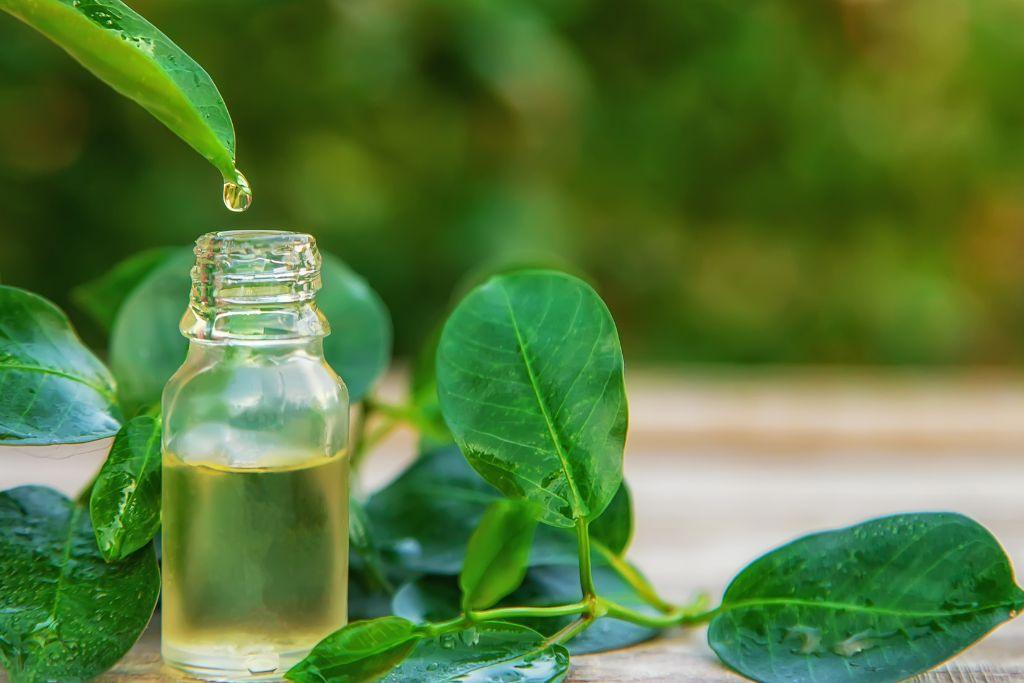Tea tree is one of the common essential oils with so many impressive benefits. This essential oil is beneficial for hair, skin, and even nails.
Along with its numerous benefits, tea tree oil is also known to be safe to use. Plus it is inexpensive. Whether you’re a fan of aromatherapy or looking for a natural solution to common hair and skin issues, tea tree oil has much to offer.
From its powerful antibacterial and antifungal properties to its soothing effects, tea tree oil truly deserves its place as a staple in any natural health enthusiast’s collection.
In this article, we will unveil 15 incredible benefits of tea tree oil for skin, hair, and other issues that will leave you amazed.
What is Tea Tree Oil?
Tea tree oil is sourced from the leaves of an American plant, Melaleuca Alternifolia. It is an essential oil known for its potent medicinal properties and has been used for centuries for various purposes.
Tea tree oil is renowned for its antimicrobial, antiseptic, and anti-inflammatory properties. It contains a compound called terpinene-4-ol, which is believed to be responsible for many of its beneficial effects.
The oil has a distinct aroma that is often described as medicinal or earthy. It is commonly used in skincare products, hair care formulations, and natural remedies for its wide range of potential benefits.
Benefits of Tea Tree Oil For Skin
1. Results in Glowing Skin
People often use tea tree oil for skin and thus it is found in skincare products. It is due to its potential to promote healthy-looking skin. It has natural antimicrobial and anti-inflammatory properties that may help address various skin concerns, such as acne, blemishes, and redness.
Also Read: Importance Of Essential Oil For Your Skin
2. Works as Hand Sanitizer
Tea tree oil possesses antimicrobial properties and can act as a natural hand sanitizer. It may help kill or inhibit the growth of certain bacteria and viruses on the skin. It is typically recommended to dilute it with a carrier oil or use commercially available tea tree oil-based hand sanitizers.
3. Avoids Skin Infection
The oil’s antimicrobial properties may also help prevent or address certain skin infections. It has been used traditionally to treat conditions like athlete’s foot, fungal infections, and even certain types of bacteria on the skin.
4. Reduces Acne and Pimples
This oil is often used as a natural remedy for acne and pimples. The antimicrobial properties of tea tree oil may help combat the bacteria that contribute to the development of acne. Additionally, its anti-inflammatory properties may help reduce redness and inflammation associated with acne.
5. Prevents Skin Cancer
While tea tree oil has shown some promise in laboratory studies for its potential anticancer properties, more research is needed to determine its effectiveness in preventing skin cancer.
6. Acts as an All-Purpose Cleanser
The antimicrobial properties of this natural oil make it a popular choice as a natural all-purpose cleanser. One of the popular benefits of tea tree oil for skin is that it is used to cleanse the skin from deep pores. It unclogs the pores and also helps the skin absorb skin products better.
7. Reduces Skin Inflammation
Tea tree oil possesses anti-inflammatory properties that may help reduce skin inflammation. It can be used topically to address conditions like eczema, psoriasis, and insect bites. However, it’s crucial to dilute tea tree oil properly and perform a patch test to ensure it doesn’t cause skin irritation.
Also Read: 10 Benefits of Neem for Skin and Hair
How to Use Tea Tree for Skin?

Tea tree oil is pretty beneficial on the skin as it has antibacterial, antifungal, antiviral, and anti-inflammatory properties. While it may work slowly to show results, it does show visible benefits on the skin. You can use it on your skin with a cotton ball.
- Wash your face with cold water
- Dip a cotton ball in tea tree oil.
- Dab it over your face.
Keep away from using strong tea tree oil. While it may work faster, you might also become allergic to it. Do not use tea tree oil on cuts or wounds. Use it twice a day to get better skin.
Also Read: Top 7 hair-care tips for Summer
Benefits of Tea Tree Oil For Hair
1. Reduces Hair Fall
Tea tree oil is occasionally used in hair care products due to its potential benefits for scalp health. It may help reduce scalp irritation, and dryness, which can indirectly contribute to reducing hair fall.
2. Helps Reduce Dandruff
Tea tree oil is often found in anti-dandruff shampoos due to its potential to address scalp conditions like dandruff and dryness. Its antimicrobial properties may help combat the fungi (Malassezia) associated with dandruff.
When used as an ingredient in shampoos, it can assist in reducing dandruff flakes and soothing the scalp.
How to Use Tea Tree for Hair?
Using tea tree oil on hair can help remove dandruff, and reduce hair fall. To use this on hair:
- Mix a few drops of tea tree oil into the shampoo.
- Shake the bottle well. Also, shake before each use.
- Apply it to your hair.
Regular use of this shampoo will show visible results on your hair. Remember that the tea tree oil may make a layer on the top of the shampoo. So it is important to shake well before every use.
Also Read: 5 Reasons Why You Should Oil Your Hair
Other Benefits of Tea Tree Oil
1. Good for Oral Health
Yes, this oil also works great for oral health. Its antimicrobial properties may help combat bacteria that contribute to gum disease, bad breath, and oral infections.
However, it’s crucial to note that tea tree oil should never be swallowed, as it can be toxic. It should only be used as a mouthwash when properly diluted and spit out after use.
2. Good for Respiratory Issues
Tea tree oil is commonly used in inhalation therapies or as an ingredient in chest rubs to help alleviate respiratory issues such as congestion, coughs, and cold symptoms. Its potential antimicrobial and anti-inflammatory properties may provide a soothing effect on the respiratory system.
3. Natural Deodorant
The antibacterial properties of tea tree oil can help combat the bacteria that cause body odor. It is sometimes used in natural deodorant formulations to provide odor-fighting benefits.
4. Treats Minor Cuts and Scratches
Tea tree oil has been traditionally used to treat minor cuts and scratches due to its potent antimicrobial properties. Remember to clean the wound thoroughly before applying tea tree oil and to seek appropriate medical attention for more severe or deep wounds.
5. Heals Wounds Faster
Some studies have suggested that tea tree oil may aid in wound healing. Its antimicrobial and anti-inflammatory properties may help prevent infection and reduce inflammation, which could contribute to faster healing.
Also Read: Skincare Tips For Teenagers For This Summer
Side Effects of Tea Tree Oil
While tea tree essential oil is generally considered safe for topical use when properly diluted, it can cause side effects in some individuals. Common side effects may include skin irritation, redness, itching, or allergic reactions.
Undiluted tea tree oil should never be applied directly to the skin, as it can lead to severe irritation or chemical burns.
Additionally, tea tree oil should not be swallowed, as it can be toxic and may cause symptoms such as nausea, vomiting, or confusion. It’s important to perform a patch test before using tea tree oil topically and discontinue use if any adverse reactions occur.
If you experience any concerning side effects or have underlying health conditions, it’s advisable to consult a healthcare professional for guidance.
Concluding
Tea tree oil can be really beneficial in a number of ways. But, as with any natural remedy, it’s advisable to consult with healthcare professionals for personalized advice and guidance.
Especially if you have underlying health conditions or experience any concerning side effects. Using tea tree oil the right way can have wonderful effects on your hair, skin, and nails.
Frequently Asked Questions
1. Can you put tea tree oil directly on your skin?
No, it is not recommended to put undiluted tea tree oil directly on your skin as it can cause skin irritation. It is important to dilute tea tree oil with a carrier oil before applying it topically.
2. What is tea tree oil good for?
Tea tree oil is known for its antimicrobial, anti-inflammatory, and cleansing properties. It is commonly used for skin care, wound care, dandruff, oral health, and as a natural remedy for certain respiratory issues.
3. Is tea tree oil good for skin?
Tea tree essential oil can be beneficial for the skin due to its potential to address various skin concerns. Its antimicrobial properties may help combat acne-causing bacteria, while its anti-inflammatory properties may reduce redness and inflammation. However, it should be used properly and in appropriate dilution to avoid skin irritation.
4. Does tea tree oil make skin glow?
Tea tree oil alone may not directly make the skin glow. However, its potential to address acne, inflammation, and other skin issues may contribute to a healthier complexion, which can give the appearance of brighter and more radiant skin.
5. Does tea tree oil lighten the skin?
Tea tree oil is not known for its skin-lightening properties. Its main benefits are attributed to its antimicrobial and anti-inflammatory properties, which can help address acne and inflammation. If you are looking for skin lightening, it’s advisable to explore other suitable options and consult with a dermatologist.
Disclaimer: This article has been written after thorough research and is based on the resources available on the internet. It is still advisable to contact a dermatologist before using any mask or recipe.








